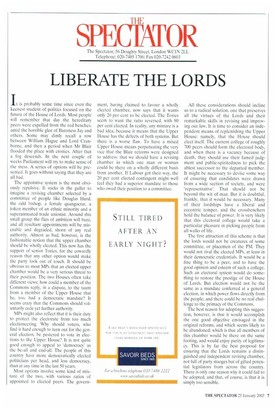SPECIATOR
The Spectator, 56 Doughty Street, London WC] N Telephone: 020-7405 1706; Fax 020-7242 0603
LIBERATE THE LORDS
It is probably some time since even the keenest student of politics focused on the future of the House of Lords. Most people will remember that day the hereditary peers were expelled from the red benches, amid the horrible glee of Baroness Jay and others. Some may dimly recall a row between William Hague and Lord Cranborne, and then a period when Mr Blair flooded the place with cronies. After that a fog descends. In the next couple of weeks Parliament will try to make sense of the mess. A series of options will be presented. It goes without saying that they are all bad.
The appointive system is the most obviously repulsive. It sticks in the gullet to imagine a revising chamber selected by a committee of people like Douglas Hurd, the odd bishop, a female quangocrat, a token member of an ethnic minority and a superannuated trade unionist. Around this small group the flies of ambition will buzz, and all resultant appointments will be miserable and degraded, shorn of any real authority. Almost as bad, however, is the fashionable notion that the upper chamber should be wholly elected. This now has the support of senior Tories, for the cowardly reason that any other option would make the party look out of touch. It should be obvious to most MPs that an elected upper chamber would be a very serious threat to their position. The two Houses often take different views: how could a member of the Commons reply, in a dispute, to the taunt from a member of the Upper House that he, too. had a democratic mandate? It seems crazy that the Commons should voluntarily cede yet further authority.
MPs might also reflect that it is their duty to protect the electorate from too much electioneering. Why should voters, who find it hard enough to turn out for the general election, be pestered to vote in elections to the Upper House? It is not quite good enough to appeal to 'democracy' as the be-all and end-all. The people of this country have more democratically elected politicians per head, and less democracy, than at any time in the last 50 years.
Most options involve some kind of mixture of the two, with various ratios of appointed to elected peers. The govern ment, having claimed to favour a wholly elected chamber, now says that it wants only 20 per cent to be elected. The Tories seem to want the ratio reversed, with 80 per cent elected. In reality, any mixture is a bad idea, because it means that the Upper House has the defects of both systems. But there is a worse flaw. To have a mixed Upper House means perpetuating the very vice that the Blair reforms were designed to address: that we should have a revising chamber in which one man or woman could be there on a wholly different basis from another. If Labour got their way, the 20 per cent elected contingent might well feel they had a superior mandate to those who owed their position to a committee. All these considerations should incline us to a radical solution, one that preserves all the virtues of the Lords and their remarkable skills in revising and improving our law. It is time to consider an independent means of replenishing the Upper House: namely, that the House should elect itself. The current college of roughly 700 peers should form the electoral body, and when there is a vacancy because of death, they should use their famed judgment and public-spiritedness to pick the ablest successor to the departed member. It might be necessary to devise some way of ensuring that candidates were drawn from a wide section of society, and were 'representative'. That should not be beyond the wit of man. But it is doubtful, frankly, that it would be necessary. Many of their lordships have a liberal and eccentric temper, and the crossbenchers hold the balance of power. It is very likely that this electoral college would take a particular pleasure in picking people from all walks of life.
The first attraction of this scheme is that the lords would not be creatures of some committee, or placemen of the PM. They would not rival the elected MPs, at least in their democratic credentials. It would be a fine thing to be a peer, and to have the good opinion and esteem of such a college. Such an electoral system would do something to restore the prestige of the House of Lords. But election would not be the same as a mandate conferred at a general election, in which power flows directly from the people; and there could be no real challenge to the primacy of the Commons.
The best reason for adopting this suggestion, however, is that it would accomplish the one good objective envisaged in the original reforms, and which seems likely to be abandoned; which is that all members of this chamber would be there on the same footing, and would enjoy parity of legitimacy. This is by far the best proposal for ensuring that the Lords remains a distinguished and independent revising chamber, not full of party stooges but of gifted potential legislators from across the country. There is only one reason why it could fail to be adopted, and that, of course, is that it is simply too sensible.


















































































 Previous page
Previous page